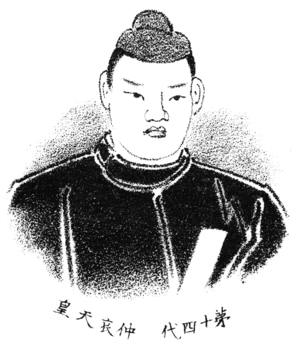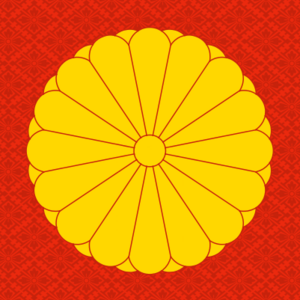Emperor Chūai facts for kids
Quick facts for kids Chūai |
|
|---|---|
| Emperor of Japan | |
 |
|
| Reign | legendary |
| Predecessor | Seimu |
| Successor | Ōjin |
| Born | legendary |
| Died | legendary |
| Burial | Ega no Naganu no nishi no misasagi (Osaka) |
Emperor Chūai (仲哀天皇,, Chūai-tennō) is known as the 14th emperor of Japan. This is according to the traditional list of rulers. Many historians believe he might be a legendary figure. His name, Chūai-tennō, was given to him much later, after his time.
We don't have exact dates for his life or when he ruled. The official list of early emperors wasn't fully decided until Emperor Kammu. He was the 50th ruler of the Yamato dynasty.
Contents
Chūai's Story in History Books
Chūai is likely a legend. However, his name is written in two important old Japanese books. These books are called the Kojiki and the Nihonshoki. He was the grandson of Emperor Keikō.
Chūai's wife was Empress Jingū. Her son later became known as Emperor Ōjin.
Life and Legacy of Emperor Chūai
We don't have much information about Emperor Chūai. This doesn't mean he never existed. There is very little information about Japanese rulers before the 29th emperor, Emperor Kimmei.
After Emperor Chūai's death, he was given an official name. This special name, called a posthumous name, was made many centuries after he was said to have lived.
The exact place where Emperor Chūai is buried is not known today. However, the Imperial Household Agency looks after a special Shinto shrine for him. This memorial shrine, called a misasagi, is in Fujiidera in Osaka Prefecture.
| Preceded by Emperor Seimu |
Legendary Emperor of Japan: Chūai 192-200 (traditional dates) |
Succeeded by Empress Jingū |
Related pages
Images for kids
-
Chūai's Kofun (mausoleum) "Ega no Naganu no nishi no misasagi"
See also
 In Spanish: Chūai Tennō para niños
In Spanish: Chūai Tennō para niños
 | Janet Taylor Pickett |
 | Synthia Saint James |
 | Howardena Pindell |
 | Faith Ringgold |



